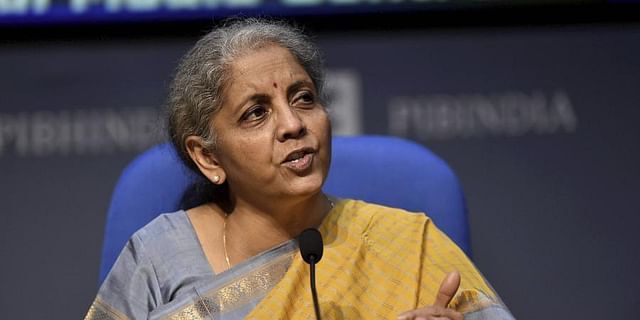Sitharaman defends handling of inflation

New Delhi: Finance Minister Nirmala Sitharaman on Tuesday put a strong defence of her handling of inflation as she compared current prices to rates existing six months before the UPA exited power, and said the GST regime has not increased the tax burden on families.
Replying to a debate on price rise in Rajya Sabha, she said the GST tax on food items such as rice, wheat flour and curd was agreed to by all states and that such a levy pre-existed on one or the other daily essentials in 22 states.
Clarifying on misgivings over the levy of GST tax on some of the most talked about items, the minister said no tax has been levied either on cash withdrawals from bank accounts or on crematorium or hospital beds and ICUs.
With opposition breathing fire over a rise in prices of daily essentials, Sitharaman compared the current price of tomato, onion and potato with that prevalent in November 2013 to say the rates are stable.
She went on to attack the Congress-led UPA regime of that time saying prices had seen triple-digit growth, with onion rates crossing Rs 100 per kg mark.
She did not mention the prices that were there when the UPA exited power in May 2014 or onion prices had crossed Rs 100 per kg mark in November 2019 and again in October 2020.
"GST has not increased the burden on families. The rate (of taxation) on some of the items prior to GST was far higher," she said. "Nobody is saying or nobody is in denial about price rise. We will see the numbers also, and what are the ground realities also. We are not running away."
The government and the RBI are taking "enough steps" to keep the inflation rate at 7 per cent.
Ideally, it should be below the 6 per cent band. "Nobody is denying."
Based on ground reports, the government has had a targeted approach to dealing with inflation. "And through the targeted approach, we are reaching sections which so desperately need that help. Of course, yes, you can do a lot more. Nobody's denying that. But that doesn't mean we are saying no, we won't do anything at all."
She said the tax on toothpowder has come down from 17% pre-GST to 12% post implementation of GST in 2017 and that on hair oil, toothpaste and soap from 29.3% to 18%, on sugar from 6% to 5%, on sweet mix from 7% to 5%, on washing machines, vacuum cleaners and TV of up to 32-inch from 31.3% to 18%, on LPG stove from 21% to 18%, on LED lamps from 15% to 12% and on kerosene pressure lanterns from 8% to 5%.
Replying to criticism of record high cooking gas LPG prices, she said the government is giving a subsidy of Rs 200 per cylinder for 12 refills in a year to the poor who got connections under the Ujjwala scheme. That subsidy would reduce the price to Rs 853 per 14.2-kg cylinder - a rate that opposition MPs said was way too high.
LPG prices, she said, were not in government hands.
On levy of GST tax on wheat, rice, pulses, curd, paneer, lassi and other daily essentials, Sitharaman said the 5% tax is only on pre-packed and labelled commodities and not those sold loose and hence does not impact the poor.
"Poor's consumption of any food item is not taxed," she said.
The levy was imposed after all states agreed to it at a meeting of the GST Council, which has representation from all states and the UTs, in Chandigarh in June. "Not one person (in the GST Council) spoke against it," she said.
Prior to the advent of GST in July 2017, every state levied a tax on some or the other food items such as cereal, pulses, curd, lassi and buttermilk, she said reading out some of the states that levied tax.
The minister said the Indian economy is better placed than its peers. "Indian economy compared to the situation prevailing in many of our peer groups and compared to the situation in many of the developed economies is definitely much better."
Amid concerns over the decline in the value of the rupee against the US dollar, Sitharaman asserted there is no collapse of the unit and it is actually finding its natural course.
Sitharaman informed the Rajya Sabha that the RBI is continuously monitoring the local currency and intervening only if there is volatility.
"The RBI interventions are not so much to fix the value of the Indian Rupee because it is free to find its own course," the minister told the Rajya Sabha during Question Hour.
On suggestions that non-resident Indians should be allowed to make remittances in foreign currency, she said it is not an assurance that the Ministry of Finance will give but she can only pass on the suggestion to the RBI.
Sitharaman said the rupee has seen more fluctuations against the US dollar but its performance is better than its peers. "We have withstood the impact of the US Fed's decisions much better than any other peer currencies," she told the house.
Actually, if you compare the Indian rupee versus other currencies, it is appreciating in its value, she said, urging the members to understand the context and speak about the Indian rupee.
"I would like to assure the member that there is no collapse of the Indian Rupee," she asserted.
On the reserves coming down, she said, "We are still somewhere in the range of (USD) 500 (billion).



